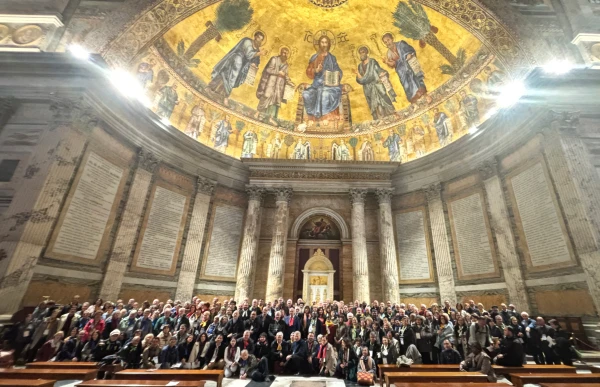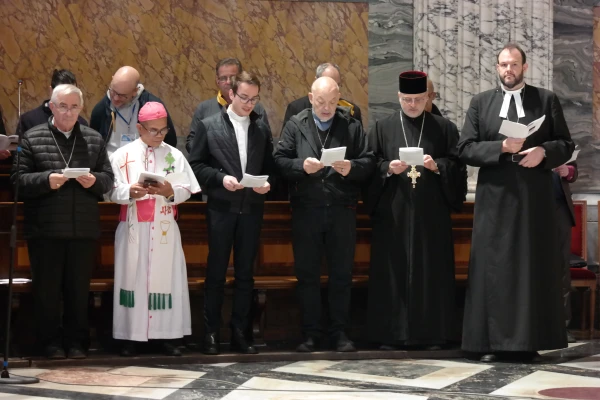The representative of Center onethe International Secretariat for the Unity of Christians of the Farmoles Movement, Enno Dijkema, stressed the urgency of the ecumenical dialogue because, as he appreciated, the division of Christians subtracts credibility to the call to peace.
“As divided Christians, our testimony is diminished to the world to talk about peace, to resolve conflicts,” said Dijkema to Aci Press in one of the pauses of the ecumenical encounter entitled “Calls to Esperanza, protagonists of the dialogue”, organized by the focol in Castel Gandolfo (Rome) from March 26 to 29.
Receive the main news of ACI Press by WhatsApp and Telegram
It is increasingly difficult to see Catholic news on social networks. Subscribe to our free channels today:
“If we were more united, we would have a much stronger message. Jesus himself said: ‘That all are one for the world to believe.’ Our division prevents us from fulfilling this mission,” he explained.
The International Conference brought together more than 250 believers of 20 Christian churches, from more than 40 countries and four continents, with the aim of reflecting on the unity of Christians, the challenges of ecumenism and the role of hope in the dialogue between Christian confessions.
The event was attended by prominent personalities of the ecumenical field, such as the Undersecretary of the Vatican Dicastery for the promotion of the Unity of Christians, Mons. Andrea Palmieri; the president of the Episcopal Commission for Ecumenism and Dialogue of the Italian Episcopal Conference, Mons. Derio Olivero; the representative of the Ecumenical Council of the Churches (CEC), Martin Illert, and the representative of the Armenian Apostolic Church before the Holy See, Archbishop Khajag Barsamian.

One of the most significant moments of the conference was the ecumenical prayer of reconciliation and for peace, held on Thursday, March 27 in the Basilica of San Pablo Extramuros. The ceremony, open to all believers, was a gesture of “unity and commitment for peace in a worldwide context marked by tensions and conflicts,” said Dijkema.

The expert stressed that the lack of unity among Christian churches is an obvious contradiction for those who observe from the outside. “If Christians preach the fraternity, but they do not live among them, her message loses credibility. In many countries with a strong Christian tradition, we still see wars, divisions and conflicts. This shows that talking about peace is not enough: we must be witnesses of it with our own life,” he said.
Dijkema compared the ecumenical path with a long -distance pilgrimage: “The unity of Christians is not yet a full reality, but we are on its way. As in every pilgrimage, there are moments of difficulty, but also moments of light that encourage us to continue moving forward.”

During the appointment, advances were valued on the road to the unity of Christians, without neglecting the obstacles that involve overcoming historical, doctrinal and cultural differences.
In any case, Dijkema stressed that ecumenism is a “path of hope.” “We have not yet reached full unity, but we see many lights on the path that indicate that it is possible. Dialogue is not only a method, but a lifestyle that we must adopt in our communities, parishes and societies,” he said.
For the expert in ecumenism of the movement of focus, the dialogue “is not just the task of religious theologians and leaders.” “Each Christian has a role in this process, from his parish or community,” he added.
Possibility of a common Easter date
The possibility of establishing a common date for the celebration of Easter between the churches of the East and West was present at the conference. This year Easter will coincide on the same date for all Christian churches.
The last time Catholics and Orthodox celebrated Easter together was in 1054. That year the schism that divided the Church into two: East and West occurred. Since then the Orthodox stopped recognizing the authority of the Pope.
“This year, on April 20, all Christian churches will celebrate Easter on the same day. But beyond this calendar coincidence, many churches want to take advantage of the opportunity to work in a common calendar. It is a symbolic, but significant step, towards unity,” said Dijkema.

